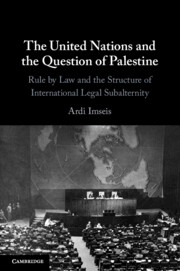 The United Nations and the Question of Palestine
The United Nations and the Question of Palestine Published online by Cambridge University Press: 16 November 2023
This chapter concludes this book by summarizing its principal findings and situating them in the larger context of the questions posed at the outset. Rather than the international rule of law ordering principle, it is the international rule by law principle that finds express and sustained illustration in the UN’s management of the question of Palestine. This phenomenon is rooted in the clash between hegemonic and subaltern interests that produce and reproduce situations in which the promise of international law is repeatedly presented as the basis of international legitimacy and peaceful coexistence among a citizenry of formally equal nation-states, but which relegates non-self-governing peoples and other subaltern societies to partial and qualified access in the system. The result is the presence of international legal subalternity as a long-range condition, a fixed feature of the international order with wider relevance for a variety of other subaltern actors and regions.
To save this book to your Kindle, first ensure no-reply@cambridge.org is added to your Approved Personal Document E-mail List under your Personal Document Settings on the Manage Your Content and Devices page of your Amazon account. Then enter the ‘name’ part of your Kindle email address below. Find out more about saving to your Kindle.
Note you can select to save to either the @free.kindle.com or @kindle.com variations. ‘@free.kindle.com’ emails are free but can only be saved to your device when it is connected to wi-fi. ‘@kindle.com’ emails can be delivered even when you are not connected to wi-fi, but note that service fees apply.
Find out more about the Kindle Personal Document Service.
To save content items to your account, please confirm that you agree to abide by our usage policies. If this is the first time you use this feature, you will be asked to authorise Cambridge Core to connect with your account. Find out more about saving content to Dropbox.
To save content items to your account, please confirm that you agree to abide by our usage policies. If this is the first time you use this feature, you will be asked to authorise Cambridge Core to connect with your account. Find out more about saving content to Google Drive.